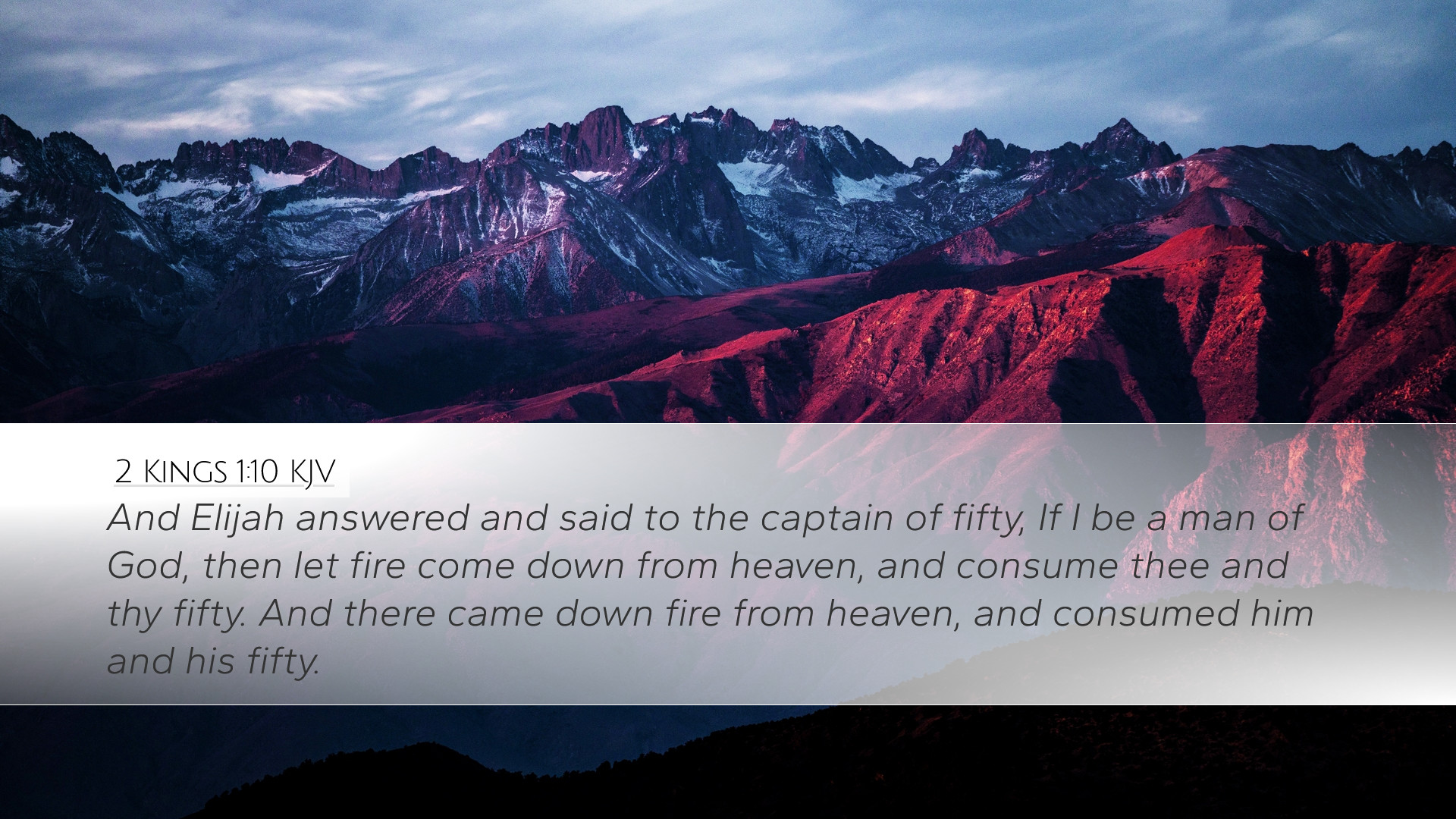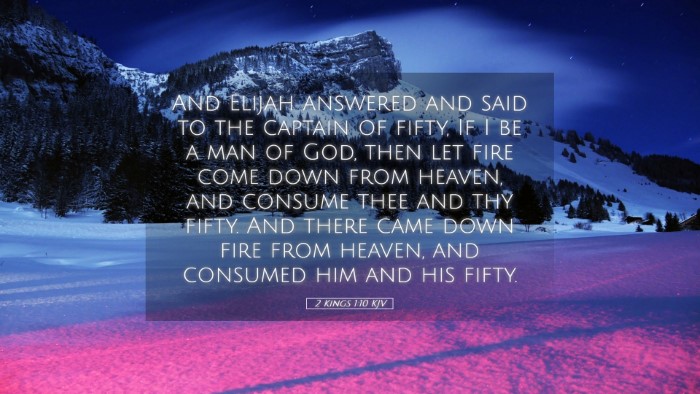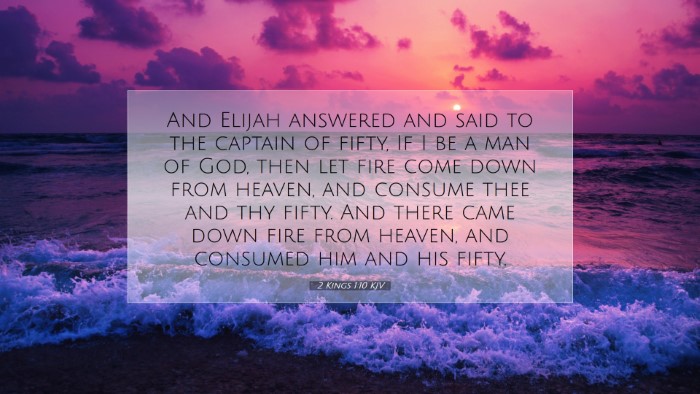Old Testament
Genesis Exodus Leviticus Numbers Deuteronomy Joshua Judges Ruth 1 Samuel 2 Samuel 1 Kings 2 Kings 1 Chronicles 2 Chronicles Ezra Nehemiah Esther Job Psalms Proverbs Ecclesiastes Song of Solomon Isaiah Jeremiah Lamentations Ezekiel Daniel Hosea Joel Amos Obadiah Jonah Micah Nahum Habakkuk Zephaniah Haggai Zechariah Malachi2 Kings 1:10
2 Kings 1:10 KJV
And Elijah answered and said to the captain of fifty, If I be a man of God, then let fire come down from heaven, and consume thee and thy fifty. And there came down fire from heaven, and consumed him and his fifty.
2 Kings 1:10 Bible Commentary
Commentary on 2 Kings 1:10
Verse Text: "But Elijah answered and said to the captain of fifty, 'If I am a man of God, let fire come down from heaven and consume you and your fifty.' And fire came down from heaven and consumed him and his fifty." (2 Kings 1:10)
Context and Background
2 Kings 1 records the account of King Ahaziah of Israel, who falls and is injured, prompting him to seek information from Baal-Zebub, the god of Ekron, rather than inquiring of the Lord. This reflects the spiritual decline of Israel and sets the stage for Elijah's confrontation with the king's messengers.
This narrative illustrates the struggle between the true worship of Yahweh and the idolatrous practices of Israel's leadership. Elijah’s bold proclamation of the power of Yahweh serves not only as a testament to God’s ability to protect and execute judgment but also highlights Elijah's role as a prophet tasked with confronting evil and idolatry.
Exegesis of the Text
The response of Elijah in verse 10 is multifaceted, drawing attention to several important theological and practical themes:
- The Authority of the Prophet: Elijah's declaration, "If I am a man of God," reinforces his prophetic authority and identity. This is not merely a challenge but an assertion of divine backing.
- The Sign of Divine Judgment: The fire coming down from heaven serves as a potent sign confirming Elijah's authority and God's dominance over false gods. It demonstrates that God responds to the faithfulness of His servants.
- Consequences of Idolatry: The captain and his fifty men sought a way that ultimately rejected the God of Israel. Their destruction becomes a warning to those who align with idolatrous practices.
Insights from Public Domain Commentaries
Matthew Henry's Commentary
Matthew Henry emphasizes the severity of the situation and the boldness of Elijah. He notes that Elijah's response serves as both a defense of his prophetic call and a demonstration of divine authority. Henry remarks on the urgency of the situation, administrating God's judgment quickly as a reminder to the people of Israel of their covenant obligations.
Henry also points out the contrast between Elijah, a servant of God, and the captain representing a wayward king. He sees this event as illustrating the principle that true worship will inevitably lead to the confrontation of false practices, encapsulating the broader theme of spiritual warfare present throughout 1 and 2 Kings.
Albert Barnes' Notes on the Bible
Albert Barnes provides a detailed analysis of the cultural and historical significance of the event. He underscores Elijah's role as a prophet during a time of moral decline in Israel. Barnes explains that fire from heaven was a familiar biblical motif symbolizing divine approval and judgment, harking back to Levitical sacrifices and earlier instances like the destruction of Sodom and Gomorrah.
Barnes also explores the nature of authority and defiance present in this encounter, demonstrating that rebellion against God's prophets equates to rebellion against God Himself. This commentary serves to warn the faithful of the consequences of leadership that ignores divine wisdom.
Adam Clarke’s Commentary
Adam Clarke brings a theological perspective that emphasizes the importance of prophetic integrity. He interprets the challenge posed by the captain as reflective of arrogance against the prophet of God. Clarke elaborates on how Elijah's invocation of judgment through fire signifies God’s response to persistent idolatry within Israel.
Clarke also highlights the urgency with which the men approached Elijah, suggesting that their dismissal of God’s sovereignty leads to dire consequences. He asserts that this narrative serves as an admonition to both leaders and people regarding their fidelity to the covenant with God.
Theological Implications
The events described in 2 Kings 1:10 carry significant implications for theology and the nature of God’s interaction with humanity:
- Divine Sovereignty: The narrative illustrates that God remains sovereign over creation and can manifest His power at will. Elijah’s prayer precedes a miraculous response that confirms God as the ultimate authority.
- Prophetic Ministry: This passage highlights the critical role of the prophet in both revealing God’s word and executing divine judgment. It compels contemporary believers to recognize and respect spiritual authority as a means of God’s communication.
- Idolatry’s Consequence: The destructive outcome of the captain and his men serves as a sobering reminder of the spiritual grave risk associated with turning away from God. It challenges individuals and churches today to evaluate their allegiance to Christ versus cultural idols.
Application for Today
For pastors, theologians, and lay believers, the message conveyed through 2 Kings 1:10 offers rich teaching points:
- Stand Firm in Faith: In times of societal decay and moral ambiguity, it is vital to stand firm in one's faith and to declare the truth of the gospel, as Elijah did.
- Respect for Prophetic Voice: There is a modern-day necessity to honor those called to shepherd and guide within the church, understanding the weight of their role in shaping the moral and spiritual ethos of the community.
- Awareness of Idolatry: This passage challenges believers to assess their lives for subtle forms of idolatry—anything that acts as a substitute for God’s rightful place in their hearts and minds.
Conclusion
2 Kings 1:10 serves as a poignant reminder of God's power, the seriousness of prophetic ministry, and the consequences of idolatry. Through the insights drawn from respected commentaries, modern readers are invited to engage with the text not only at a scholarly level but also through the lens of application for life and ministry today. The message of judgment for idolatry and affirmation of God's authority remains as relevant now as it was at the time of Elijah, challenging the church to maintain fidelity to its calling.


